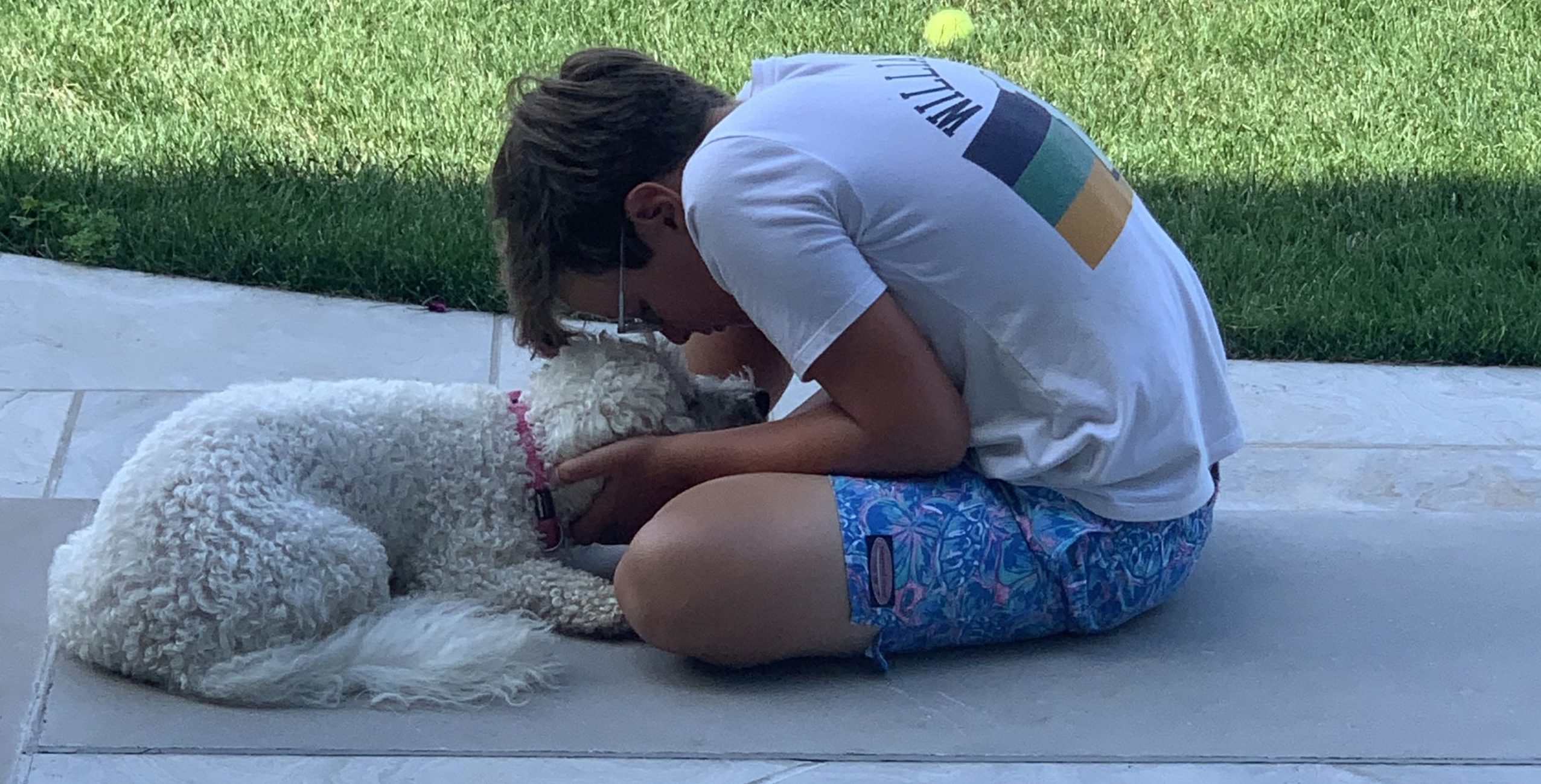Ten years ago, when my youngest child was an infant, my mother got a puppy: a bichon frisé named Bimbo. It was not love at first sight for my family and Bimbo. I am the first to admit that partially we were being superficial and judgmental because let’s just say, Bimbo wouldn’t win the Westminster Dog Show Award for Best in Breed. And what she lacked in beauty, she matched in irritating behavior, best represented by her annoying habit of nipping and licking at everyone’s feet while they walked. To cap it off, in those early years, my daughter was mortally afraid of dogs and Bimbo’s lack of boundaries (particularly with feet) terrified her, requiring us to carry my daughter from our car into the house when we visited my parents. Early on, we venomously gave Bimbo the nickname of “Rat Dog” due to her rodent-like looks and our deep dislike of her.
Fast forward 10 years, when we found refuge in my parents’ house during COVID, beginning our journey of living with them AND Bimbo for 4.5 months. Suffice it to say, life took a turn toward the unexpected as it related to Bimbo. Do you remember in high school when you had two friends who couldn’t stand each other and then one day they showed up at school, totally in love, all over each other and attached at the hip? That’s kind of what happened with Bimbo. In lockdown my children suddenly became obsessed with Bimbo, petting her, carrying her around the house, lovingly putting her to bed each night. My husband who, truth be told was the originator of the “Rat Dog” moniker, patiently let Bimbo in and out of the side door by his desk all day long, petting her as she moved past him. Bimbo’s nickname went from the disparaging “Rat Dog” to the adoring “Bimby” — used by ALL members of my family in a sing-song voice dripping with affection. My children, who had previously rejected her, now competed over who would get to cuddle with “Bimby” and have her sit on their laps. She became a constant companion to my youngest son’s early morning TV watching and my oldest son’s late night Xbox gaming, a fixture during family card games and chess matches, moving from person to person for her pats. In our final weeks at my parent’s house, the relationship had progressed to such an extent that Bimbo refused to sleep in the mudroom where she had slept for the 10 years prior, barking and scratching at the back door until she was allowed to sleep upstairs in my daughter’s room. Yes, the very same daughter who all those years ago needed to be carried from the car into the house in order to avoid Bimbo.
What the hell had happened? How had our unfeeling rejection of Bimbo turned to utter adoration? Who had changed — us or her? At first glance, I might say that Bimbo had been redeemed as she went from reviled to beloved during our time in lockdown, but in our final days staying at my parents’ house, my mother said to us, “You know, Bimbo is the same dog she has always been.” So if Bimbo was the same, then we must be the ones who had changed. It wasn’t Bimbo, but our family, who had experienced some kind of redemption during the pandemic.
Which begs the question: what was the source of our collective redemption? What had allowed us to love and care for an animal during pandemic whom we had summarily rejected during ordinary times? What was it about our new pandemic perspective that had opened the door for us to radically change our view on Bimbo? The first and most obvious answer lies in the need children and teenagers’ have to find a place for their affection, particularly while in quarantine, making a dog a perfect option. Shut off from the rest of the world, unable to have physical contact with others, Bimbo became the obvious and happy recipient of my children’s affection. Without being able to care for their friends, they could shower that love on Bimbo’s white, furry head. When loneliness crept into their hearts during isolation, they had an eager candidate to keep them company. When they felt stressed or anxious about the unpredictable world around them, caring for Bimbo helped reduce those hard feelings. When they got annoyed with their family members, they could find a sympathetic ear in Bimbo. (Side note, for those who think pets aren’t good listeners, I’ve lost count of how many of my Dynamo Girls will say that they turn to their pets when they need a trusted friend to talk to.)
My kids’ need for physical affection and easy companionship gets me part of the way to understanding our transformed relationship with Bimbo, but I don’t think it gets me all the way there. It still left the question as to why my husband and I, arguably the most vehemently anti-Bimbo proponents pre-pandemic, could be found petting her, feeding her and calling her by her new nickname during the pandemic. What had shifted so dramatically within the two of us? How had we come to join Team Bimbo? My husband and I have discussed this question ad nauseam over the last few months and what we’ve come up with is this: the pandemic and Bimbo taught us empathy on a level we never knew possible.
At first, when we had just moved into my parents’ house, we simply felt bad for Bimbo — our friends had been renting a house next door and Bimbo had basically moved in with them, blissfully living her best life. The friends then moved away and Bimbo came back home to us, the new residents, the awful people who ignored her. Knowing that Bimbo was going to be really low after leaving our friends’ loving arms, my husband and I made a conscious decision to be kind to her, to be empathetic to her plight, to make up for the love and affection she had lost. At first, we didn’t actually care about Bimbo, but on principle, we felt it was important to be kind to a creature who was hurting. And then at some point, our practiced empathy for Bimbo became true affection; our kindness, much to our surprise, became genuine care. We went from petting Bimbo because we felt badly for her, to petting Bimbo because we wanted to. Our commitment to practicing empathy for its own sake took us down a new path of behavior where we unexpectedly became kinder, more caring people. And then our perspective shifted: empathy was no longer born of a kindness that already existed, our decision to practice empathy birthed a kindness we never imagined would exist. Bimbo wasn’t redeemed. It was we who were redeemed. Redeemed by our choice to be empathetic, even when it didn’t come naturally, because we knew another living creature required it of us.
So how does this newfound lesson during pandemic instruct me as we head into fall and the start of school? Fall is always a time of high stress: back-to-school anxiety, a million forms to be filled out, endless logistics to be sorted. But this fall is the mother of all stressful back-to-school experiences because of the uncertainty around school opening this fall. How will things will work? Will our current arrangements even last? Will we be able to stay safe? There will likely be days where people will be the worst versions of themselves — angry, short-tempered, rude and selfish. As I look forward to the coming weeks — the start of a school year where all of us will be under incredible stress — I will be reminding myself that just like Bimbo, these folks who are showing me the worst version of themselves, need and deserve empathy. So my goal is to carry my new pandemic perspective into the rest of my life this fall. It won’t just be Bimbo who receives my conscious empathy. I will extend it to anyone I possibly can. They may be “the same dog” they’ve always been (to borrow my mother’s term) but how I choose to engage with them can be different. I can choose to push them away or I can choose to empathize with their pain and care for them. I can recoil from their erratic behavior or I can choose to empathize with what suffering lies beneath the surface driving those behaviors. I can judge their different choices about how to manage during a pandemic or I can choose to empathize that there are challenges informing those choices about which I know nothing. Underneath the short-tempered language may very well be deep anxiety. Underneath the selfish behavior may very well be profound fear. Underneath the surprising rudeness may be unbearable levels of stress. None of us will be the best version of ourselves during these difficult days, but by choosing to offer empathy we may at least be better and kinder versions of ourselves than we might have been.
So this piece is dedicated to Bimbo, the artist formerly known as “Rat Dog,” to whom I owe such gratitude for teaching me one of the great lessons of the pandemic: opting for empathy doesn’t just help the recipient, it also might just redeem the giver in the process.
If you enjoy the Dynamo Girl Newsletter, you can receive it directly to you inbox by subscribing here.







